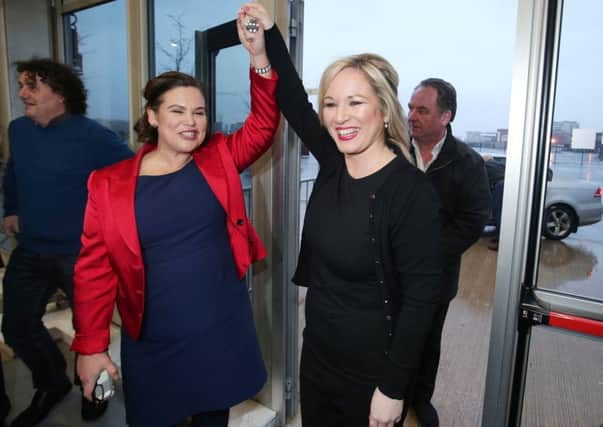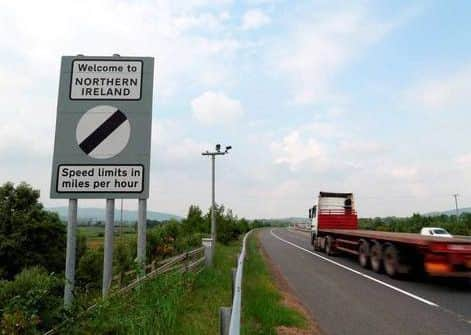Top economist: Unionists have been far too pessimistic about the Stormont election results


The sight of Sinn Finn supporters in jubilant mood will always disconcert unionists, and the surge in nationalist support has led many to anticipate a decisive lurch towards a united Ireland.
Moreover a list of Sinn Fein demands as long as your arm in post-election talks with the Secretary of State does not bode well for a return to politics as usual.
Advertisement
Hide AdAdvertisement
Hide AdTwo weeks after the election we can begin to put the emotional shock to one side and take a hard look at the situation as it really is. First, and most obviously, nationalists did not win the win the election.


Sure, Sinn Fein and the SDLP won 39 seats to the 38 won by the DUP and UUP but the British and Irish press tended to overlook the fact that two other unionists were also elected, giving the unionist designation a slender majority of one.
Much has been made of the fact that the DUP no longer has the 30 MLAs needed to block such things as gay marriage. In practice this is unlikely to make much difference. The DUP is likely to gain enough support from other MLAs when it needs to block reform.
For instance 52 MLAs voted against gay marriage when it was last debated. Many of the blocking ‘petitions of concern’ in the last Assembly were brought by nationalist parties which individually lacked the requisite 30 MLAs. Most petitions of concern in the last Assembly were in any case not about gay marriage or similar social issues, but to block Sinn Fein attempts to stymie the introduction of UK-wide welfare reforms.
Advertisement
Hide AdAdvertisement
Hide AdSinn Fein may well be in a mood to rock the boat more vigorously if a new Assembly is formed, but will not have more influence than in the last Assembly. They will not nominate the First Minister. Even together with the SDLP they will command only 44% of the seats.


The new factor is that unionists are also short of a majority and the Alliance will have a deciding say except when petitions of concern are invoked, which may be rather often. None of this is likely to involve instability in constitutional issues, including Irish Unity.
Even so, the dent to unionist confidence could and should have been avoided. Sinn Fein were allowed to force an election in the worst possible circumstances for unionists. Sinn Fein might have found some other resigning issue, even with without the political gift of the Renewable Heating Initiative, but their electoral ground would have been weaker.
In the event, the big story of the election was the huge (16%) rise in turnout with an extra 109,000 votes since last May. The nationalist turnout which had been falling for years shot up in this election and the SF/SDLP vote increased by a whopping 28% (70,000 extra votes). The unionist vote also rose, but only by 8% (26,600 extra votes). The unionist vote was also split between 2 larger and 6 minor parties.
Advertisement
Hide AdAdvertisement
Hide AdSinn Fein managed to exploit nationalist fears over Brexit most effectively and their first preference vote rose by a third. Their illusion of a drift towards inevitable Irish unity received a mighty set-back which they have had to combat. This was not a matter of taking votes from the SDLP whose vote also rose considerably.


Unionist attempts to get their vote out also succeeded, but just not as much as Sinn Fein’s. The DUP vote actually rose by 10% and the UUP by 18%, but part of this came from the collapse of UKIP and a smaller fall in TUV votes. Many of the extra votes that might have gone to the DUP or UUP seem to have gone instead to Alliance whose vote rose most of all, by 50% (24,000 extra votes).
One reading of all of this is that it was a one-off nationalist success, unlikely to be repeated. Brexit fears may be realised, but in my view are much more likely to fade away. The border is very likely to be kept open for the movement of people.
Commercial traffic will require border checks, but there are enormous pressures for the UK and Irish governments to devise arrangements which minimise disruption for companies and which provide no easy targets for dissidents.
Advertisement
Hide AdAdvertisement
Hide AdNeither is Brexit likely to have much of a negative impact on the Northern Ireland economy. Our re-examination of Treasury estimates of the impact published during the referendum campaign, finds them to be exaggerated.


The short-term predictions have already been proved wrong. In the longer term, a free trade agreement between the UK and EU is in everyone’s interests and will greatly help the Northern Ireland border issue, including the dairy industry.
Finally, what of Irish Unity? Some unionists tell me that we should support a border poll while Theresa May is PM and get it out of the way for once or all. This is unlikely to happen, but if it does, the result is a foregone conclusion. Northern Ireland depends utterly on financial support from GB.
This pays for half of all public spending in NI, and is worth £20,000 a year to a family with two children. Neither the Republic of Ireland, nor anyone else, is in any position to replace this finance.
Advertisement
Hide AdAdvertisement
Hide AdThe funds coming in from the EU are a tiny fraction of UK support and in any case are just UK money recycled back to NI through Brussels.
It is perhaps understandable that successive UK governments have preferred not to keep reminding Northern Ireland of its financial dependency. This is the reality and it means that Northern Ireland is, and always will be, far better off inside the UK.
Northern Ireland remains the future, but if unionists want to continue to dominate its politics they must embrace unionist unity and radical reform to attract more of the young professional classes.
Let’s see if they up to it.
• Dr Graham Gudgin is research associate at the Centre For Business Research, University of Cambridge, and senior economic advisor at Oxford Economics. He was Special Advisor to the Northern Ireland First Minister, David Trimble, on economic policy from November 1998 -2002